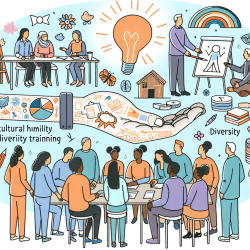Understanding Vaccine Hesitancy Among Marshallese: A Pathway for Practitioners
The COVID-19 pandemic has highlighted significant disparities in health outcomes among different communities. One such community is the Marshallese in Northwest Arkansas, who have faced unique challenges regarding COVID-19 vaccine uptake. A recent study, "COVID-19 vaccine hesitancy among Marshallese in Northwest Arkansas (USA)," provides critical insights that practitioners can leverage to improve vaccination rates and health outcomes in this community.
Key Findings from the Study
The study identified two primary themes affecting vaccine uptake: barriers and facilitators. Understanding these can help practitioners tailor their approaches to encourage vaccination.
Barriers to Vaccination
- Fear: Concerns about side effects and misinformation create fear, deterring individuals from getting vaccinated.
- Lack of Knowledge: Many Marshallese lack information about how vaccines work, leading to hesitancy.
- Negative Perceptions: Some community members hold negative views about the vaccine's effects on health.
- Health Concerns: Pre-existing conditions like diabetes and asthma raise concerns about vaccine safety.
- Transportation: Limited access to transportation hinders the ability to reach vaccination sites.
Facilitators of Vaccine Uptake
- Trusted Information: Reliable information from healthcare providers can encourage vaccination.
- Positive Perceptions: Sharing positive vaccine experiences can influence others positively.
- Cultural Leaders: Influential figures like community leaders and pastors can play a crucial role in promoting vaccination.
- Convenient Locations: Offering vaccines at familiar community sites can improve access.
- Mandates: Legal requirements for vaccination can increase uptake.
Practical Recommendations for Practitioners
Practitioners can implement several strategies to address these barriers and leverage facilitators:
- Organize mobile vaccination clinics in community-friendly locations to address transportation issues.
- Engage community leaders to disseminate accurate vaccine information and share personal vaccination experiences.
- Provide culturally appropriate materials and translation services to ensure understanding and comfort.
- Facilitate open discussions to address fears and misconceptions about the vaccine.
Encouraging Further Research
While this study provides valuable insights, it also highlights the need for further research to explore vaccine hesitancy in other Pacific Islander communities. Practitioners are encouraged to collaborate with researchers to develop culturally sensitive interventions that can be adapted to different contexts.
For practitioners interested in delving deeper into this topic, the original research paper offers a comprehensive analysis of the study's findings and methodologies. To read the original research paper, please follow this link: COVID-19 vaccine hesitancy among Marshallese in Northwest Arkansas (USA).










